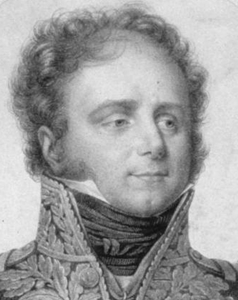General Sigismond Frédéric Berckheim

Born: August 9, 1772
Place of Birth: Ribeauvillé, Haut-Rhin, France
Died: December 29, 1819
Place of Death: Paris, France
Arc de Triomphe: BERCKHEIM on the east pillar
Pronunciation:
Entering the regiment of La Marck as a sous-lieutenant in May of 1789, Sigismond Frédéric Berckheim was promoted to lieutenant in the 44th Infantry in 1791 but the 44th refused to take him due to their belief that he had deserted his old regiment. Undeterred, Berckheim rejoined the army in October of 1794 as a chasseur in the 1st Chasseurs à Cheval. In January of 1795 he entered the Central School of Public Works and that August he left the school as a lieutenant in the 8th Chasseurs à Cheval. Serving with the Army of the Rhine, Berckheim became an aide-de-camp to General Duverger in October. From 1797 to 1799 he served in the Army of Germany, Army of Mainz, and Army of the Danube and in 1798 he was named an aide-de-camp to General Ferino. In 1800 Berckheim joined the Army of the Rhine and that July he was promoted to capitaine in the 2nd Carabiniers.
After the years of peace that followed, Berckheim was named an equerry to Emperor Napoleon in March of 1805. That July he was promoted to chef d'escadrons and he served with the Grande Armée during the campaign against the Third Coalition that year. In 1806 Berckheim was appointed a major and he served against Prussia, and then in April of 1807 he was promoted to colonel of the 1st Cuirassiers. Leading his men into action later that year, he served at the Battle of Heilsberg and the Battle of Friedland in June. Two years later Austria attacked and Berckheim served in Germany with the army. In April of 1809 he fought at Eckmühl and Ratisbon, in May he fought at Aspern-Essling , and in July he fought at Wagram and Znaim. Afterwards Berckheim was promoted to général de brigade. He served in Germany for the next few years, commanding a mobile column ordered to search for insurgents and deserters in the 13th military division. He was also named a Baron of the Empire.
At the end of 1811 Berckheim took command of the 1st Brigade of Doumerc's 3rd Division of Cuirassiers. He served on the campaign against Russia, fighting at Polotsk in August and then at the Berezina in November. In 1813 he took command of the 1st Brigade of Bourdessoulle's 1st Heavy Cavalry Division in the I Cavalry Corps. He served throughout the campaign in Saxony that year and in May he was named a Commander of the Legion of Honor and in September he was promoted to général de division. In January of 1814 Berckheim was ordered to command the levée en masse in the département of Haut-Rhin. In February he took command of a light cavalry division and in March he served at the Battle of Arcis-sur-Aube.
After Napoleon's abdication and the Bourbon Restoration, Berckheim was named commander of the département of Haut-Rhin and a Knight of Saint Louis. When Napoleon returned to power in 1815 for the Hundred Days, Berckheim supported him and was given command of the reserve division of the Army of the Rhine under General Rapp. When the Bourbons were again restored, Berckheim was put on non-activity but he was then elected as a deputy of Haut-Rhin.
Bibliography
Updated June 2018
© Nathan D. Jensen